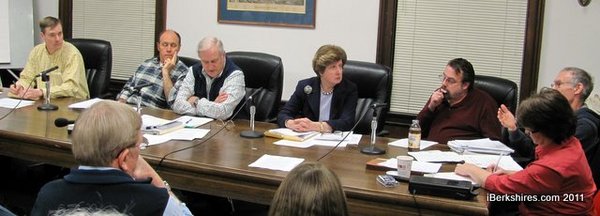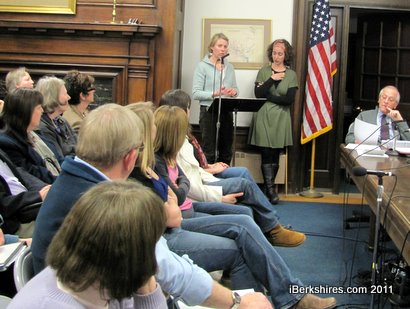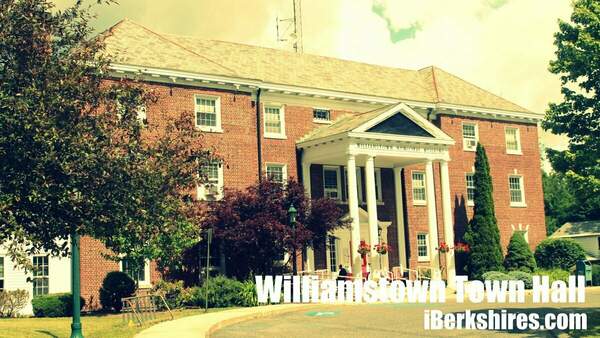
Williamstown Panel Recommends Funding Church Purchase
 Katie Swayby and Julia Munemo of the Williamstown Community Preschool explained some of the preservation work planned at Methodist Church. |
The Community Preservation Act Committee voted 6-2 Tuesday night before a full house to recommend the controversial application, along with two other applications, the 1753 House and gravestone preservation at Southlawn. The total funds town meeting will be asked to appropriate is $284,330.
The articles will now go the Finance Committee and Selectmen for placing on the warrant before returning to the board for final review.
The funds will come from the town's Community Preservation Fund, to which 2 percent of taxes is set aside each year to fund open space, historic preservation and affordable housing.
The board has debated whether the money was being appropriated for the Williamstown Community Preschool or for the historic preservation of the church, under which it would qualify for CPA. The preschool has occupied a more modern edition of the church for nearly 40 years but was facing the loss of its home with the merger of the Williamstown and North Adams Methodist churches last fall.
"I look at this grant application as the epitome of the benefits of the CPA," said board member David Rempell. "That this is an application that enhances the infrastructure of this community in lots of different ways."
Rempell, also a selectman, said the head of the chairman of the state CPA had shared with the Selectmen what he considered outstanding examples of projects that have been funded by CPA since its inception. "It was quite educational because you saw the creativity of different communities that through CPA funds were able to enhance the quality of life in the community."
But board member Malcolm Smith questioned the need to preserve the property at this point.
"I'm not comfortable that this is legitimate or sensible or even appropriate use of the townspeoples' tax dollars," said Smith, adding he saw no "existential threat" to the property. "I think there are other ways to get this done. ... that building is not going anywhere; it's not going to be another abandoned derelict church."
Ronald Turbin, representing the church, said he received a call from an interested buyer; should the preschool not buy it, it would have to be sold and possibly torn down. "I don't think the New England Conference would have it in mothballs waiting for the preschool to raise money."
Chairman Philip Knight said he thought the request was similar to successful applications by the Little Red Schoolhouse and barns at Williamstown Rural Lands Foundation. In both cases, the funds were used toward privately owned historic buildings that also offered educational opportunities.
Board member Christopher Winters called those bad precedents. "[I have] a great deal of trepidation of the preschool undertaking a risky endeavor," he said. "As a rule they do not invest in bricks and mortar ... they don't own buildings because they can't afford to maintain them."
"I would not vote $1 for this preservation of this building if I thought the custodian were inadequate to the task," said committee member Peter Fohlin. "I am further persuaded that there's a substantial contribution by the applicant seemingly in proportion to their ability ... this feels like a responsible custodian stepping up to the plate."
 Ronald Turbin, representing the church, said the 131-year-old church would be sold and possibly demolished if the preschool didn't buy it. |
Members Dan Gendron, Linda Conway and Mark T. Reinhardt indicated support.
Two applications were withdrawn: $22,000 toward the relocation of the historic organ at United Methodist (Turbin said the congregation preferred to keep it in the church for present) and a request from the Conservation Commission for $90,500 to buy the Wylde property off North Hoosac Road.
An application for $599,000 for the town to purchase Sand Springs Pool died without a motion after Fohlin pointed out no qualified governmental body had stepped forward to accept the property.
An application for $20,000 toward a $31,500 barn building project at Rural Lands Foundation was rejected 4-2 with Knight and Smith, both members of the foundation, recusing themselves.
The application for $20,000 to repair the chimney at the 1753 House was approved in full but an application for $64,780 to continue funding a multiphased restoration of Southlawn Cemetery was severely curtailed at $13,480, just enough to address stones that could fall and injure someone.
Winters failed to get support to fund the three approved projects at 85 percent; instead, board members voted to fund the first two projects at 100 percent leaving less than $16,000 of the $286,776 available for historic preservation.
The funding includes $233,776 in the cumulative unappropriated account and $53,000 specific to historic preservation from the past two fiscal years. The fund still has $129,000 in the open space account and $53,000 in affordable housing. Knight said that does not include money to be collected next fiscal year.















